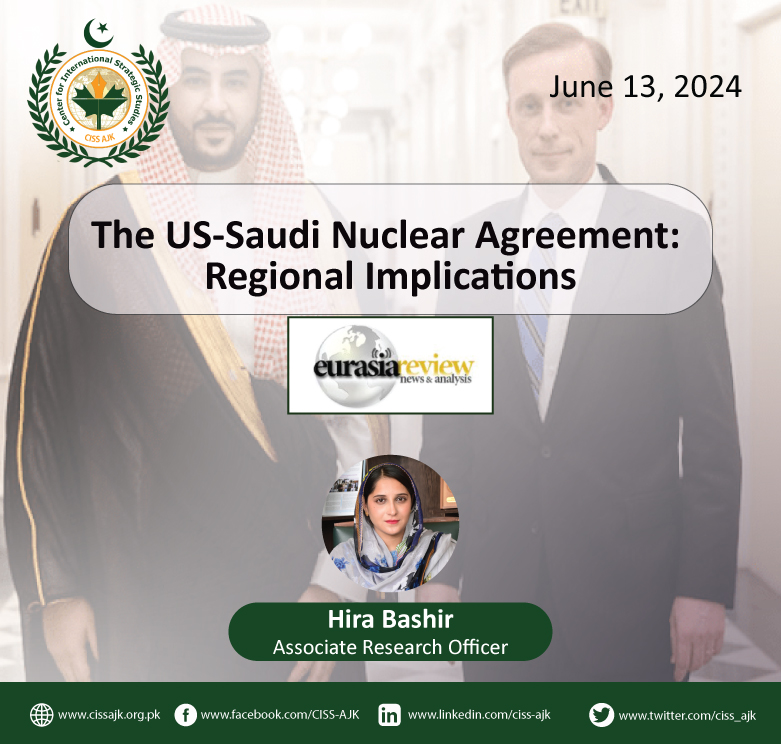Several media reports have suggested that Saudi Arabia is close to a “mega deal” with the United States. The “mega deal” is also known as “grand bargain” because the agreement would significantly strengthen US-Saudi relations, given it includes a mutual defense pact and collaboration on advanced technologies such as AI and a civilian nuclear program.
On May 19, 2024, White House National Security Adviser Jake Sullivan visited Saudi Arabia for discussions, including a civil nuclear cooperation agreement. Under Crown Prince Mohammed bin Salman’s Vision 2030 reform plan, Saudi Arabia aims to generate substantial renewable energy and reduce emissions, with nuclear energy playing a significant role. Initially, this deal was tied to Saudi Arabia normalizing relations with Israel. However, Saudi Arabia insists that normalization must include Israel recognizing a path to Palestinian statehood, which Israel opposes, putting normalization on hold.
Saudi Arabia’s nuclear energy ambitions have been relatively slow compared to the UAE. After establishing the King Abdullah City for Atomic and Renewable Energy in Riyadh in 2010, Saudi officials announced plans to construct 16 nuclear reactors to generate 20 percent of the kingdom’s electricity by 2032. By 2017, the Saudi National Atomic Energy Project outlined a civil nuclear program featuring large nuclear power plants, small modular reactors, and fuel cycle activities. Despite this ambitious vision, progress on small modular reactor projects has been slow, with plans now including just two large nuclear power reactors.
What can be implications of this civil nuclear agreement? This deal could significantly impact both the economic and industrial sectors, positioning U.S. industries to secure contracts for building Saudi nuclear power plants while giving the US more influence over Saudi oil prices, which it prefers to keep low before elections. Geopolitically, the United States hopes to offer Saudi Arabia a civil nuclear pact, security guarantees, and a pathway toward a Palestinian state in exchange for Riyadh normalizing relations with Israel.
Allowing a U.S.-operated enrichment plant in Saudi Arabia might be more acceptable politically than a nationally operated Saudi plant, aligning with NSG guidelines to mitigate proliferation risks. However, there are concerns that this deal could trigger a nuclear race in the Middle East. If the US changes its nonproliferation policy and allows Saudi enrichment, it could lead to a chain reaction where the UAE might renegotiate its nuclear agreement, and countries like Turkey and Egypt could turn to Russia and China for their enrichment plants.
The risk of nuclear proliferation is further heightened by the breakdown of international efforts to prevent it and increasing threats to use nuclear weapons, or to launch them into outer space. Cooperation agreements can often be used to improve or create a strategic partnership: in the case of Saudi Arabia, nuclear cooperation serves as a way to actively compete with China and Russia. The agreement could help the U.S. compete with China and Russia by strengthening technological collaboration and strategic alliances. By partnering with Saudi Arabia on advanced technologies like AI and nuclear energy, the U.S. can maintain a technological edge. This deal can also enhance the U.S. influence in the Middle East, countering China’s Belt and Road Initiative and Russia’s military presence. Moreover, it can reduce Saudi reliance on oil, lessening China’s leverage, and positioning U.S. companies to dominate the regional nuclear energy market, diminishing opportunities for Chinese and Russian industries.
Nevertheless, Saudi Arabia is not especially keen on the direct purchase of nuclear reactors from the U. S. but wants the approval of the U. S. to enter into cooperation with more capable and experienced states to build nuclear power plants in the short time and at a relatively low cost such as South Korea. Experts’ claims that permitting the Saudis to develop nuclear capabilities poses certain risks rather than opportunities at the international level as it will lead to other countries in the region to emulate the same hence causing a proliferation of nuclear weapons in the Middle East which is already instable. Thus it necessitates that US officials seek a balance between engagement and the challenges of nonproliferation.
Hira Bashir is Associate Research Officer at CISS AJK and works on Nuclear Politics & Peaceful use of Technology.

